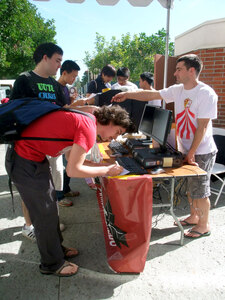Personal traits can affect votes
A day into the voting period, the question currently at the forefront of every Undergraduate Student Government presidential candidate’s mind is: who will win?
The candidates have spent the past week advertising their platforms and convincing students they are most qualified for the job. But when it comes down to it, students are likely to vote based on myriad other factors.

Decisions · Students submit their votes for USG office at a voting center outside the Lyon Center on Tuesday. All voters were given free food. - Youli Zheng | Daily Trojan
Ann Crigler, professor of political science, said voters consider things like a candidate’s appearance, whether or not the candidate has similar values to their own or if the candidate shares the same network of associations. Voters will often consider the issues, she said, but the other factors are often more important.
Some students said it was, in fact, personal connections that influenced their vote.
Justin Mercer, a junior majoring in environmental engineering, said he is voting for a particular ticket because he is friends with one of the candidates.
“I know [him] personally, so I’m going to vote for him,” Mercer said.
Mercer said he does not know the candidates’ platforms, but he is supporting the ticket because of his personal connection.
Ted Tao, a junior majoring in business administration, said he has worked with the candidate he will vote for and is convinced he has the necessary qualities to lead USG.
“I realized that he is actually a very gifted individual in terms of listening and keeping up with the students’ perspectives and being able to really, truly understand what they need,” Tao said. “He’s very organized, very focused and very driven, and I just like the fact that he’s always smiling.”
Tao did not attend USG’s debate and admitted his vote is based largely on character. He added, though, that he thinks a lot of students don’t weigh platform points heavily when they vote.
Some students, however, have made a point of learning about the candidates’ stances on the issues.
“I didn’t really think I was going to be that interested but once [the candidates] presented some of the issues I really did get involved, and kind of did find out more, and want to get involved and wanted to learn more about the candidate and what they were presenting,” said Debbie Rumbo, a freshman majoring in political science and Spanish.
Ultimately, though, Rumbo said she will vote based on presentation rather than platform when it comes to specific issues.
“For me … it’s oratory — how they present themselves to the public [and] if they seem to want to incorporate what we think into their campaign,” she said.
According to Crigler, many vote for the people who are most like them. It is critical for candidates to have a community of supporters behind them, she said.
Traditionally the residential community has shown the highest number of voters compared to the Greek or commuter communities, according to Scott Hummel, co-director of elections and recruitment for USG and a junior majoring in communication.
“Last year was unique because we saw an increase in voting among the Greek community,” he added.
Hummel said he is confident that current USG President Holden Slusher’s involvement in Greek life was a big factor in his winning the USG presidency last spring.
Crigler said she was not surprised that many past winners have been Greek.
“Sororities and fraternities already have a strong base of support,” Crigler said. “It certainly helps get the message out more effectively.”
This year, the campaign period began Feb. 8 and candidates will continue to campaign throughout the voting period, ending Feb. 18, which only gives students 10 days to get to know the candidates.
“Ten days is the most reasonable time,” Hummel said. “It takes a lot of man power, money and resources to make sure we promote elections and allow candidates to promote themselves.”
USG remains neutral in providing information on candidate platforms. According to the election code, distributing information on the candidates and their platforms is the candidates’ duty. Placing this responsibility on the presidential hopefuls — some of whom currently hold positions within USG — saves USG from entering into potentially dangerous waters.
“We take the issue of being an unbiased organization seriously,” Hummel said. “We want to make sure we are not an exclusive, internally hiring organization.”
Presidential hopefuls in the running this year include Chris Cheng, USG’s director of external relations; Dylan Dann, a Greek senator; Andrew Matson, USG’s director of academic affairs; and Jonathan Munoz-Proulx.
Voting began Tuesday and will continue through Thursday. Students can vote online or at several locations on campus.
